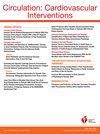经皮冠状动脉介入治疗患者的抗血小板去除策略
IF 6.1
1区 医学
Q1 CARDIAC & CARDIOVASCULAR SYSTEMS
Circulation: Cardiovascular Interventions
Pub Date : 2024-04-16
DOI:10.1161/circinterventions.123.013263
引用次数: 0
摘要
双重抗血小板疗法--阿司匹林和 P2Y12 抑制剂的组合--仍然是经皮冠状动脉介入治疗后立即预防缺血性并发症的标准抗血小板疗法。然而,支架技术、经皮冠状动脉介入技术、二级预防的辅助药物治疗等方面的最新进展,以及人们对出血对预后影响的认识不断提高,这些都不可避免地与双重抗血小板疗法有关,因此,人们开始研究可减少出血和保持缺血保护的替代抗血小板疗法。血栓形成并发症主要发生在经皮冠状动脉介入治疗后的头几个月,而出血风险随着时间的推移保持稳定;这一观察结果奠定了抗血小板降级概念的基础,即在经皮冠状动脉介入治疗后的早期采用强度较大的抗血小板疗法,之后再采用强度较小的抗血小板疗法。根据学术研究联盟提出的新定义,停用一种抗血小板药物、从强效 P2Y12 抑制剂转为氯吡格雷或减少抗血小板药物的剂量均可实现降级。本综述讨论了支持抗血小板降级的原理和证据,提供了使用这些新方案的实用指南,并对该领域的未来发展提出了见解。本文章由计算机程序翻译,如有差异,请以英文原文为准。
Antiplatelet De-Escalation Strategies in Patients Undergoing Percutaneous Coronary Intervention
Dual antiplatelet therapy—the combination of aspirin and a P2Y12 inhibitor—remains the standard antiplatelet regimen recommended to prevent ischemic complications immediately after percutaneous coronary intervention. Nonetheless, recent advances in stent technologies, percutaneous coronary intervention techniques, adjunctive pharmacotherapy for secondary prevention, and the rising awareness of the prognostic impact of bleeding, which are inevitably associated with dual antiplatelet therapy, led to the investigation of alternative antiplatelet regimens related to fewer bleeding and a preserved ischemic protection. Thrombotic complications occur mostly in the first months after percutaneous coronary intervention, while the risk of bleeding remains stable over time; this observation laid the foundation of the concept of antiplatelet de-escalation, consisting of a more intense antiplatelet regimen early after percutaneous coronary intervention, followed by a less potent antiplatelet therapy thereafter. According to new definitions proposed by the Academic Research Consortium, de-escalation can be achieved by discontinuation of 1 antiplatelet agent, switching from a potent P2Y12 inhibitor to clopidogrel, or by reducing the dose of antiplatelet agents. This review discusses the rationale and the evidence supporting antiplatelet de-escalation, provides practical guidance to use these new regimens, and gives insights into future developments in the field.
求助全文
通过发布文献求助,成功后即可免费获取论文全文。
去求助
来源期刊

Circulation: Cardiovascular Interventions
CARDIAC & CARDIOVASCULAR SYSTEMS-
CiteScore
10.30
自引率
1.80%
发文量
221
审稿时长
6-12 weeks
期刊介绍:
Circulation: Cardiovascular Interventions, an American Heart Association journal, focuses on interventional techniques pertaining to coronary artery disease, structural heart disease, and vascular disease, with priority placed on original research and on randomized trials and large registry studies. In addition, pharmacological, diagnostic, and pathophysiological aspects of interventional cardiology are given special attention in this online-only journal.
 求助内容:
求助内容: 应助结果提醒方式:
应助结果提醒方式:


